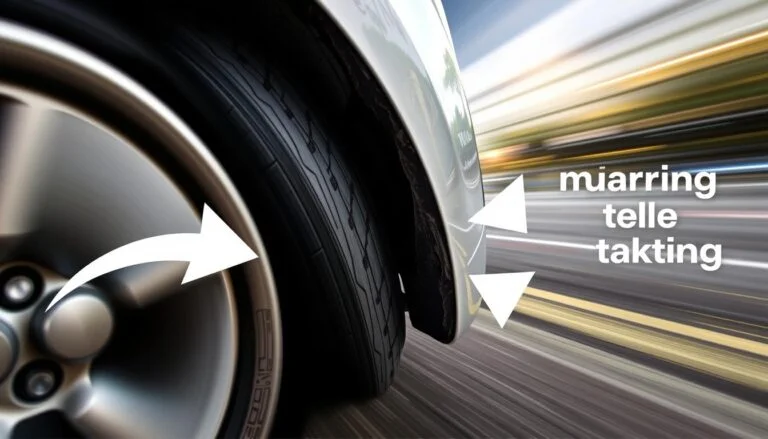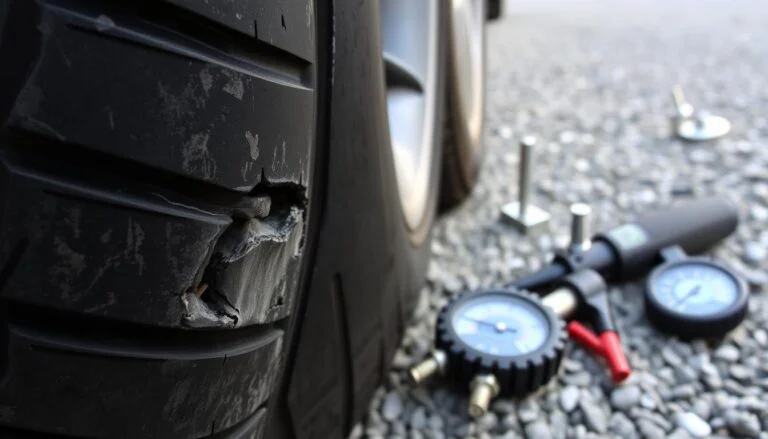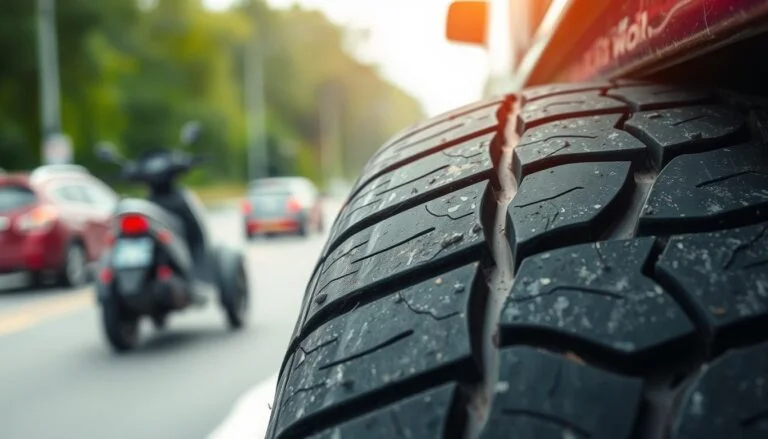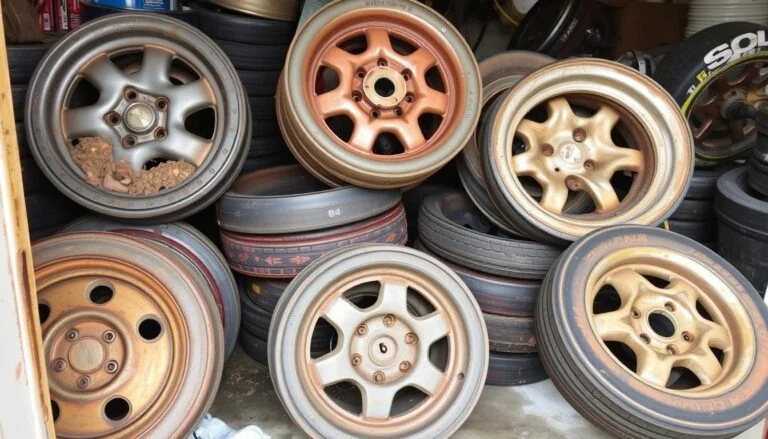What are the signs of a bad wheel bearing?
It’s important to know the signs of a bad wheel bearing for your car’s safety and performance. Wheel bearing problems can be hard to spot until they get serious. This can lead to expensive fixes or even make driving unsafe.
By catching these issues early, you can keep your car running smoothly. This helps avoid more damage and keeps your vehicle reliable.

Key Takeaways
- Identifying wheel bearing issues early can prevent safety hazards.
- Listen for unusual noises that may indicate wheel bearing problems.
- Be aware of vibrations or wobbling while driving.
- Regular maintenance can help avoid premature wheel bearing failure.
- Consult experienced mechanics for professional advice and repairs.
Understanding the Function of a Wheel Bearing
Wheel bearings are key to a vehicle’s smooth tire operation. They help the tires rotate with little friction, boosting vehicle performance. This reduces resistance, leading to better fuel efficiency and longer tire and suspension life. Knowing how a wheel bearing works is crucial for car owners and enthusiasts.
Role in Vehicle Performance
Wheel bearings do more than just support wheel rotation. They are vital for keeping the vehicle stable and handling well. A good wheel bearing ensures the vehicle steers smoothly and stays stable, especially at high speeds. Mechanics stress how important wheel bearings are for vehicle performance, as problems can harm safety and driving.
Basic Mechanics of Wheel Bearings
Wheel bearings are designed with mechanical engineering in mind. They usually have steel balls or rollers in a metal ring. Lubrication is key to reduce friction and wear. Mechanical texts say the quality of these parts is crucial for reliability.
Automotive training materials also point out the importance of wheel bearing mechanics. Knowing how they work helps in diagnosing and maintaining them properly.
Common Symptoms of a Bad Wheel Bearing
Knowing the common symptoms of a bad wheel bearing is key for keeping your vehicle safe and running well. One big sign is unusual noises that change with speed and direction. These sounds can go from grinding to humming and get louder when you speed up or turn.
Feeling vibrations while driving might mean you have a wheel bearing issue. These vibrations get worse at higher speeds and make driving less stable and uncomfortable. They can also wear out your tires unevenly, shortening their life and affecting how your vehicle handles.
Another important sign is if your vehicle doesn’t handle right. A bad wheel bearing can make a wheel wobble, making it hard to steer smoothly. This can be dangerous, especially when you’re making sharp turns or sudden moves.
| Symptom | Description | Impact |
|---|---|---|
| Noise | Grinding or humming | Discomfort, potential component damage |
| Vibration | Shaking felt through the steering wheel | Uneven tire wear, driving instability |
| Handling Issues | Wobbling wheel | Compromised safety, difficult maneuvering |
Being aware of these common symptoms helps drivers spot wheel bearing failure symptoms early. Quick action is needed to keep your vehicle in top shape and ensure safety isn’t at risk because of detecting wheel bearing problems.
Wheel Bearing Noise: What to Listen For
It’s important to know the different sounds your wheels can make. This helps you catch problems early. It keeps your car running smoothly and safely.
Grinding Sounds
A grinding sound from your wheels is a warning sign. It sounds like metal rubbing against metal. This usually happens when the bearings need oil.
Drivers should listen for this sound. It could mean bigger problems that cost a lot to fix if ignored.
Humming or Growling Noise
A humming noise or a growling noise from your wheels is another warning. These sounds get louder when you’re going fast. A humming noise might mean your bearings are wearing unevenly.
A growling noise is a sign of serious damage. It means your bearings are in bad shape.
| Type of Noise | Possible Indication |
|---|---|
| Grinding Sound | Severe bearing damage, metal-on-metal contact |
| Humming Noise | Misalignment or uneven bearing wear |
| Growling Noise | Advanced bearing deterioration |
Knowing these sounds helps you spot wheel bearing problems early. It keeps your car in good shape. Listen for any unusual noises to keep your car safe and well-maintained.
Experiencing Vibration While Driving
Feeling vibration while driving is very concerning. It can mean your car has a problem. The wheel bearing is often the culprit. Knowing why is key to keeping your car safe and running well.

Causes of Wheel Bearing Vibration
Wheel bearing vibration usually comes from worn-out or damaged bearings. These parts are vital for smooth wheel rotation. Here are some reasons why it happens:
- Wear and Tear: Bearings can wear down from constant use and load.
- Insufficient Lubrication: Without enough oil, bearings get hot and rub more.
- Contamination: Dirt, water, and other debris can damage bearings.
Vibration at Different Speeds
Noticing vibration at different speeds can help find wheel bearing problems. Here’s what you might see:
- Low Speeds: You might feel slight pulsations.
- Moderate Speeds: Vibration gets stronger and can be felt through the wheel.
- High Speeds: At high speeds, vibrations can be very strong. This might mean serious damage.
Knowing how vibrations change with speed helps find the problem. It’s a step towards fixing it quickly.
How a Bad Wheel Bearing Can Lead to Uneven Tire Wear
A bad wheel bearing is more than a simple problem. It affects your car’s performance a lot. Uneven tire wear is a clear sign of wheel bearing trouble. When a wheel bearing fails, it messes with the wheel’s alignment and balance.
Auto mechanic service studies show this link is real. Mechanics see uneven tire wear when wheel bearings go bad. This happens because a bad bearing makes the wheel wobble. This wobble changes how the tire meets the road.
Tire makers stress checking wheel bearings in regular car care. Good bearings keep wheels aligned and balanced. This reduces the chance of uneven tire wear.
Vehicle alignment experts agree. They say wheel bearing issues can cause big misalignment. This leads to uneven tire wear. Fixing these problems early can save money and make driving safer.
In short, watching your wheel bearings is key. Ignoring them can cause big problems. These problems can affect your safety and cost you money.
Investigating a Wobbling Wheel
A wobbling wheel is not just a minor problem. It often signals a serious issue with your vehicle’s wheel bearings. It’s crucial to tackle this problem to ensure your safety and avoid more damage.

How to Check for a Wobbling Wheel
Checking for a wobbling wheel is easier than you think. First, park your car on a flat surface and raise it. Hold the wheel at the 12 and 6 o’clock spots and rock it. If it moves, you have a wobbling wheel, which means a wheel bearing problem.
Here’s a simple guide:
- Lift the vehicle using a jack and secure it with jack stands.
- Hold the wheel at different positions to feel for any looseness or play.
- Rotate the wheel and listen for grinding or unusual noises.
- Check for any visible damage or wear on the wheel bearing.
- If unsure, have a professional mechanic check your car.
Consequences of Ignoring a Wobbly Wheel
Ignoring a wobbly wheel can lead to serious problems. Driving with a bad wheel bearing can cause loss of control, faster tire wear, and even a wheel separation. This could lead to accidents and serious injuries.
Here are some risks to consider:
| Potential Risk | Outcome |
|---|---|
| Loss of Vehicle Control | Difficult handling and potential to veer off the road |
| Increased Tire Wear | Shortened tire lifespan and added expense |
| Severe Mechanical Damage | Expensive reparations and vehicle downtime |
| Complete Wheel Separation | High risk of accidents and injuries |
Regular checks for wheel wobble and quick action can prevent these dangers. Always put safety and maintenance first to keep your vehicle in top shape.
Recognizing Wheel Bearing Failure Symptoms
Spotting wheel bearing failure early can prevent bigger problems later. Knowing the signs helps keep your car safe and running well.
Immediate Signs of Wheel Bearing Failure
Here are some immediate signs of failure to watch out for:
- Loud noises like humming, grinding, or growling from the wheel area.
- Wheel play when the car is lifted and the wheel is moved back and forth.
- Steering wheel shakes or wobbles, especially at slow speeds.
- Tires wear unevenly, showing the wheel isn’t turning right.
Long-term Effects of Wheel Bearing Issues
Ignoring these signs can cause serious problems:
“Ignoring wheel bearing issues can lead to the bearing breaking down completely. This can cause the wheel to come off while driving, which is very dangerous,” says Jane Smith, an automotive expert.
These ongoing issues can also harm other car parts. This can lead to expensive fixes or even make the car unusable.
| Immediate Symptoms | Long-term Effects |
|---|---|
| Noise from wheel area | Complete breakdown of the bearing |
| Steering wheel vibration | Other component damage |
| Uneven tire wear | Expensive repair costs |
Wheel Bearing Grinding and Noise
A wheel bearing grinding noise is a clear sign of trouble. This sound comes from the wheel and gets louder with time. It means your wheel bearing is wearing out and needs fixing fast.
Studies show that grinding sounds come from metal rubbing against each other in the bearings. If the lubrication breaks down or the bearing gets damaged, you’ll hear these noises.
| Symptom | Cause | Severity |
|---|---|---|
| Grinding Noise | Metal friction and wear within the bearing | High |
| Persistent Grinding Noise | Continued deterioration of the wheel bearing | Critical |
| Other Wheel Noise Issues | Various mechanical failures | Variable |
Experts say fixing these sounds quickly stops bigger problems. Persistent grinding noise makes driving uncomfortable and unsafe. It’s crucial to fix wheel noise issues fast.
Car owners agree that acting early saves money and time. If you ignore a wheel bearing grinding noise, you might face expensive repairs later.
When to Consider Wheel Bearing Replacement
Knowing when to replace wheel bearings is key for your car’s performance and safety. Regular maintenance can prevent expensive repairs and extend your car’s life. Spotting the signs early can avoid sudden breakdowns and keep your rides smooth.
Timing for Wheel Bearing Maintenance
Wheel bearings usually need to be checked or replaced every 85,000 to 100,000 miles. But, this can change based on how you drive, your car’s type, and how much you use it. It’s important to have them checked during your car’s regular maintenance.
Since wheel bearing problems don’t always show up right away, regular checks are crucial. They help catch issues before they get worse.
DIY vs Professional Replacement
There are two main choices for replacing wheel bearings: doing it yourself or getting a professional to do it. DIY can save money and be satisfying if you have the right tools and know-how. But, it needs careful attention and knowledge of your car’s mechanics.
If you’re not sure you can do it right, it’s best to get a professional. They have the skills to find and fix any problems correctly. This ensures your car gets the best care and is installed properly.
Thinking about these points can help you decide when and how to replace your wheel bearings. Regular checks and quick action can keep your car safe and running well for a long time.
FAQ
What are the signs of a bad wheel bearing?
Signs of a bad wheel bearing include noise while driving, like grinding or humming sounds. You might also feel vibrations or see uneven tire wear. It’s important to catch these signs early to avoid damage to your vehicle.
The National Highway Traffic Safety Administration and other experts stress the need for quick diagnosis and repair.
What role does a wheel bearing play in vehicle performance?
Wheel bearings help your vehicle’s tires spin smoothly. They support the rotation with little friction. This is key for your vehicle’s stability and handling.
Without working wheel bearings, your vehicle’s performance and safety can suffer. Leading service providers and engineering texts agree on this.
What are the basic mechanics of wheel bearings?
Wheel bearings let wheels rotate with little friction. They have steel balls or rollers in a metal ring, called a race. This setup supports the vehicle’s weight and allows for smooth motion.
Automotive technician training materials say regular maintenance is vital for these components to work right.
What are common symptoms of a bad wheel bearing?
Common symptoms include unusual noises like grinding or humming, vibrations while driving, and uneven tire wear. Consumer reports and mechanic forums say fixing these issues quickly is key to avoiding more damage and ensuring safety.
What types of wheel bearing noise should I listen for?
Listen for grinding sounds, which mean worn bearings, and humming or growling noises for rough bearing surfaces. Guides and podcasts recommend these specific sounds to spot issues early.
What causes wheel bearing vibration while driving?
Vibration can come from wear and tear, causing the bearing to lose its smooth rolling. This leads to a shaky feeling while driving. Diagnostics and blogs say these vibrations change with speed and shouldn’t be ignored.
How can a bad wheel bearing lead to uneven tire wear?
A bad wheel bearing can mess up wheel alignment and balance. This causes tires to wear unevenly. Guides and technicians say fixing this quickly is key for even wear and good vehicle performance.
How do I check for a wobbling wheel?
Lift the vehicle and move the wheel by hand. Noticeable movement or play means a bad wheel bearing. Safety standards and repair tutorials offer safe home checks.
What are the consequences of ignoring a wobbly wheel?
Ignoring a wobbly wheel can cause serious damage and loss of control. It’s crucial to fix it right away to avoid safety risks. Accident studies highlight the need for quick repairs.
What are the immediate signs of wheel bearing failure?
Signs include loud grinding noises and significant wheel vibration. Long-term, it can damage the wheel assembly and suspension. Studies and interviews stress the need to spot these symptoms early.
What causes wheel bearing grinding and noise?
Grinding noises mean severe wear or damage to the bearing. Persistent noise shows a rough bearing surface. Reports and testimonials say this is a serious issue needing immediate action.
When should I consider wheel bearing replacement?
Replace the bearing if you notice persistent noise, vibration, or uneven tire wear. Regular checks can catch wear early. While DIY replacement is possible, professional service ensures safety and proper installation.





